Mercedes EQA VS VW ID. Buzz Cargo – Specs, Efficiency & Price Comparison
Which model is the better choice – the Mercedes EQA or the VW ID. Buzz Cargo? We compare performance (292 HP vs 340 HP), boot capacity (340 L vs ), efficiency (14.40 kWh vs 19.20 kWh), and of course, the price (43500 £ vs 43600 £).
Find out now which car fits your needs better!
The Mercedes EQA ({ body-type_1}) is powered by a Electric engine and comes with a Automatic transmission. In comparison, the VW ID. Buzz Cargo (Cargo Van) features a Electric engine and a Automatic gearbox.
When it comes to boot capacity, the Mercedes EQA offers 340 L, while the VW ID. Buzz Cargo provides – depending on what matters most to you. If you’re looking for more power, you’ll need to decide whether the 292 HP of the Mercedes EQA or the 340 HP of the VW ID. Buzz Cargo suits your needs better.
There are also differences in efficiency: 14.40 kWh vs 19.20 kWh. In terms of price, the Mercedes EQA starts at 43500 £, while the VW ID. Buzz Cargo is available from 43600 £.
Compare all the key specs now and find out which model fits your lifestyle best!
Mercedes EQA
The Mercedes-Benz EQA presents a refined blend of elegance and electric performance, perfectly suited for urban environments. Its sleek and modern design emphasises aerodynamic efficiency while providing a sumptuous interior that epitomises luxury and comfort. With advanced technology seamlessly integrated into its user-friendly interface, the EQA ensures a connected and enjoyable driving experience.
details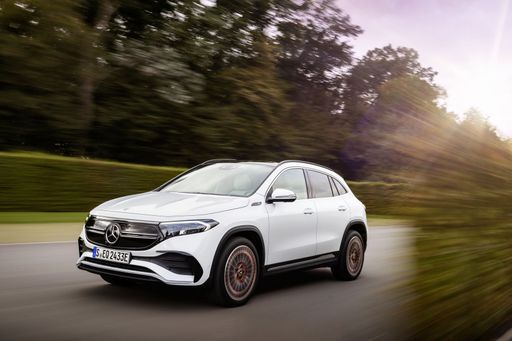 @ group-media.mercedes-benz.com
@ group-media.mercedes-benz.com
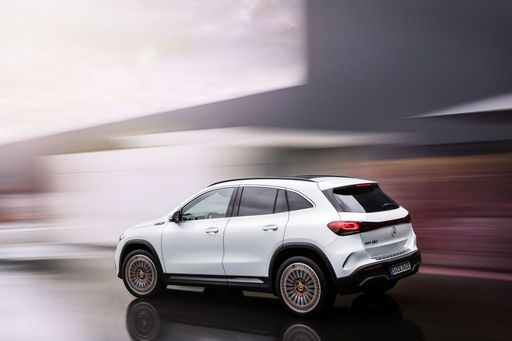 @ group-media.mercedes-benz.com
@ group-media.mercedes-benz.com
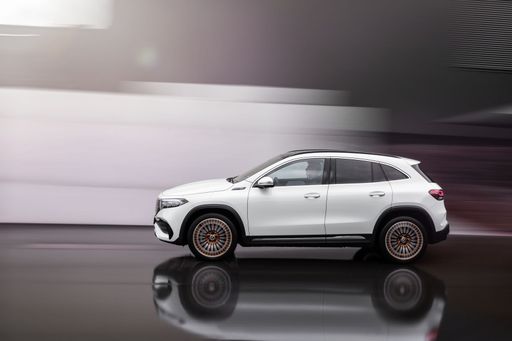 @ group-media.mercedes-benz.com
@ group-media.mercedes-benz.com
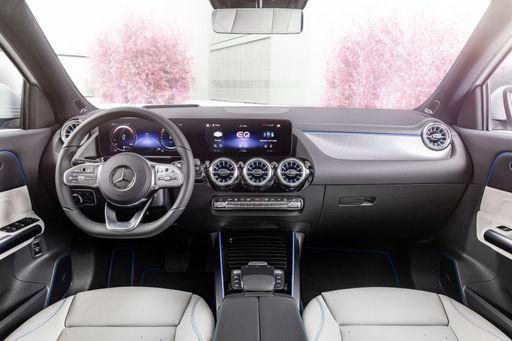 @ group-media.mercedes-benz.com
@ group-media.mercedes-benz.com
VW ID. Buzz Cargo
The VW ID. Buzz Transporter represents a bold leap into the future with its innovative electric design and retro-inspired aesthetic. Combining practicality with modern technology, it offers a spacious interior and advanced connectivity features ideal for both urban and long-distance journeys. This vehicle stands as a testament to Volkswagen's commitment to sustainability and forward-thinking mobility solutions.
details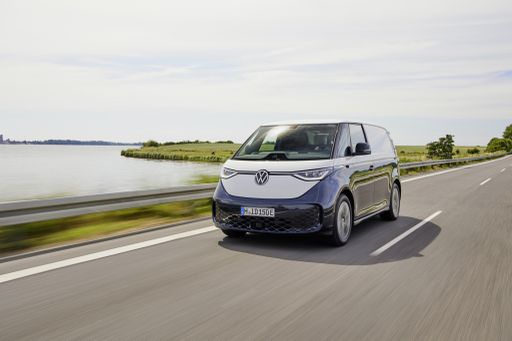 @ volkswagen-newsroom.com
@ volkswagen-newsroom.com
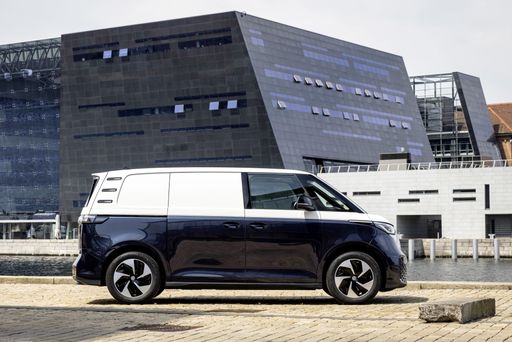 @ volkswagen-newsroom.com
@ volkswagen-newsroom.com
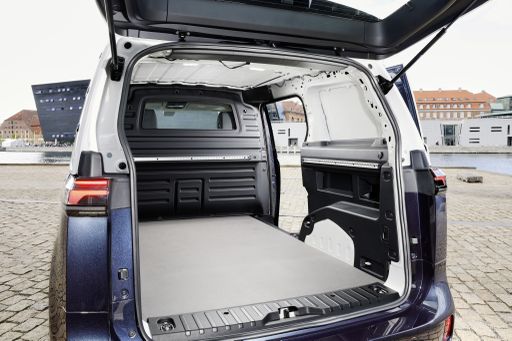 @ volkswagen-newsroom.com
@ volkswagen-newsroom.com

|

|
|
|
|
Costs and Consumption |
|
|---|---|
|
Price
43500 - 57400 £
|
Price
43600 - 51400 £
|
|
Consumption L/100km
-
|
Consumption L/100km
-
|
|
Consumption kWh/100km
14.4 - 16.9 kWh
|
Consumption kWh/100km
19.2 - 20.3 kWh
|
|
Electric Range
458 - 561 km
|
Electric Range
330 - 455 km
|
|
Battery Capacity
66.5 - 70.5 kWh
|
Battery Capacity
59 - 79 kWh
|
|
co2
0 g/km
|
co2
0 g/km
|
|
Fuel tank capacity
-
|
Fuel tank capacity
-
|
Dimensions and Body |
|
|---|---|
|
Body Type
SUV
|
Body Type
Cargo Van
|
|
Seats
5
|
Seats
3
|
|
Doors
5
|
Doors
4
|
|
Curb weight
2045 - 2115 kg
|
Curb weight
2264 - 2510 kg
|
|
Trunk capacity
340 L
|
Trunk capacity
-
|
|
Length
4463 mm
|
Length
4712 mm
|
|
Width
1834 mm
|
Width
1985 mm
|
|
Height
1608 - 1613 mm
|
Height
1932 mm
|
|
Payload
425 kg
|
Payload
640 - 753 kg
|
Engine and Performance |
|
|---|---|
|
Engine Type
Electric
|
Engine Type
Electric
|
|
Transmission
Automatic
|
Transmission
Automatic
|
|
Transmission Detail
Reduction Gearbox
|
Transmission Detail
-
|
|
Drive Type
Front-Wheel Drive, All-Wheel Drive
|
Drive Type
Rear-Wheel Drive, All-Wheel Drive
|
|
Power HP
190 - 292 HP
|
Power HP
170 - 340 HP
|
|
Acceleration 0-100km/h
6 - 8.6 s
|
Acceleration 0-100km/h
-
|
|
Max Speed
160 km/h
|
Max Speed
145 - 160 km/h
|
|
Torque
385 - 520 Nm
|
Torque
310 - 679 Nm
|
|
Number of Cylinders
-
|
Number of Cylinders
-
|
|
Power kW
140 - 215 kW
|
Power kW
125 - 250 kW
|
|
Engine capacity
-
|
Engine capacity
-
|
General |
|
|---|---|
|
Model Year
2024 - 2025
|
Model Year
2024
|
|
CO2 Efficiency Class
A
|
CO2 Efficiency Class
A
|
|
Brand
Mercedes-Benz
|
Brand
VW
|
Mercedes EQA
An Introduction to the Mercedes-Benz EQA: A Glimpse of the Future
The Mercedes-Benz EQA stands at the forefront of automotive innovation, representing a harmonious blend of luxury, performance, and sustainability. As part of the prestigious EQ range, this all-electric SUV embodies the essence of modern electromobility. In this article, we delve into the technical sophistication and innovative features of the EQA that make it a standout choice in the electric vehicle market.
Under the Bonnet: Powertrain and Performance
The Mercedes-Benz EQA offers a versatile range of specifications to cater to various preferences and requirements. From the agile front-wheel-drive models to the more robust all-wheel-drive versions, the EQA provides a wide spectrum of power outputs ranging between 190 PS and 292 PS. This impressive power comes alongside an efficient energy consumption of 14.4 to 16.9 kWh/100km, offering an electric range of up to 561 km, making it suitable for both city commutes and longer journeys.
Intelligent Design and Efficiency
Designed to achieve optimal aerodynamics, the EQA's exterior combines elegance with efficiency. Its streamlined dimensions feature a length of 4,463 mm, a width of 1,834 mm, and a height ranging from 1,608 to 1,613 mm. The adaptive use of materials ensures a competitive gross weight of 2,045 to 2,115 kg while maintaining a remarkable 0 g/km CO2 emission, indicative of its commitment to sustainable driving.
Interior Comfort and Technological Innovation
Inside, the EQA is designed to offer maximum comfort and state-of-the-art technology. It accommodates up to five passengers with ample room and a boot capacity of 340 litres. The advanced MBUX (Mercedes-Benz User Experience) system is at the heart of the cabin, enabling intuitive interaction through voice or touch controls, ensuring that every journey is as convenient as it is connected.
Safety and Driving Assistance
Safety is paramount in the EQA, with an array of driver assistance systems to enhance security on the road. From adaptive cruise control to active lane-keeping assist, the EQA's suite of safety features ensures a secure and confident driving experience. These systems are integrated seamlessly, offering peace of mind without compromising on the joy of driving electric.
Cost and Value Proposition
With starting prices ranging from €50,777 to €66,961, the EQA positions itself as a cost-effective luxury electric SUV. The investment is further justified by its minimal running costs, with monthly expenses between €1,179 and €1,496 and a cost per km between 47.2 and 59.9 cents. This competitive pricing is complemented by its maintenance savings, making it a prudent choice for those making the transition to electric mobility.
Conclusion: A New Era of Electric Luxury
The Mercedes-Benz EQA exemplifies a fusion of luxury, sustainability, and cutting-edge technology. Its impressive range, intelligent design, and advanced features embody the future of electric vehicles. Whether you seek efficiency, style, or state-of-the-art innovation, the Mercedes-Benz EQA offers all this and more, marking a significant milestone in the evolution of electric driving.
VW ID. Buzz Cargo
Reimagining the Classic: The VW ID. Buzz Transporter
The automotive industry has recently been inundated with a range of electric vehicles (EVs), but few can claim a lineage as iconic as the Volkswagen ID. Buzz Cargo. A modern-day reimagining of the classic VW Microbus, the ID. Buzz Transporter seamlessly blends nostalgia with cutting-edge technology and sustainable performance.
Power Meets Precision: Performance and Efficiency
Available in multiple configurations, the ID. Buzz Transporter offers both rear-wheel drive and all-wheel drive options. The base model features an impressive 286 horsepower and a respectable electric range of 461 km, thanks to its 19.2 kWh consumption per 100 km. For those who crave more power, the all-wheel-drive model ups the ante with a thrilling 340 horsepower and a range of 432 km, facilitated by its slightly higher 20.3 kWh/100 km consumption.
Both versions rely on an efficient reduction gearbox, ensuring a smooth and automatic driving experience. The rear-wheel-drive's entry-level model provides a more accessible point for EV enthusiasts with 170 horsepower and an overall easier handling package.
The Heart of an Electric Revolution: Battery and Range
Power comes from robust battery configurations that reflect VW's commitment to sustainable performance. The ID. Buzz Transporter boasts a 79 kWh battery in its higher-end models, allowing expansive commutes or work-related travels. Meanwhile, the 59 kWh option offers a reduced footprint, without substantially compromising on performance, to align perfectly with its more entry-level 170 HP variant.
Functional Innovation: Design and Practicality
While the exterior design pays homage to its retro predecessor, the four-door ID. Buzz is all about embracing modern interior design. The cargo van accommodates up to three seats, making it not only a style statement but a practical choice for businesses needing a workhorse with a zero-emission output.
Weighing in at a curb weight range from 2264 kg to 2510 kg, depending on the model chosen, the vehicle is a testament to Volkswagen's focus on durability and reliability. Despite its weight, the ID. Buzz delivers a payload ranging from 640 kg to 753 kg, maintaining crucial cargo efficiency.
Sustainability Meets Technology: Features and Future Outlook
Volkswagen intentionally integrated forward-thinking technology into the ID. Buzz, emphasizing zero emissions with a CO2 rating of 0 g/km and maintaining an A-grade CO2 efficiency class. These advancements, paired with a maximum speed of 160 km/h and an impressive torque (ranging from 310 Nm to 679 Nm based on the selected variant), set a new standard for electric utility vehicles.
Conclusion: A Symbol of Tomorrow, Today
The ID. Buzz Transporter signifies VW's earnest step into the future while paying homage to its rich heritage. Priced between €50,825 and €59,922, the vehicle caters to a range of consumers looking for a versatile and eco-friendly solution without sacrificing quality or style. With its innovative engineering and nostalgic charm, the ID. Buzz Transporter is poised to capture the imagination of both traditional VW fans and new EV adopters in 2024.
The prices and data displayed are estimates based on German list prices and may vary by country. This information is not legally binding.
